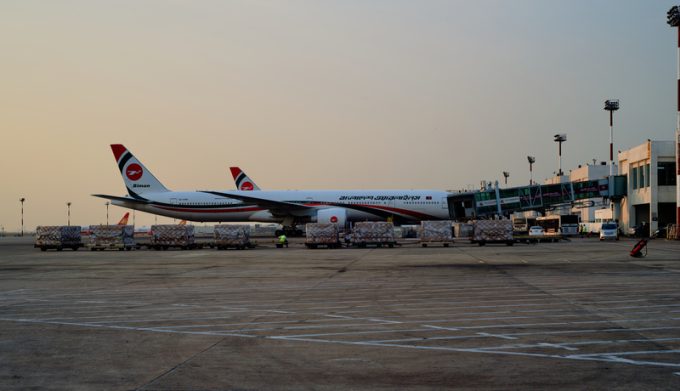Rates update, week 51: GRIs boost prices, with more to come in January
Container spot rates on the transpacific trades shot up this week, on the back of ...
FDX: ABOUT USPS PRIVATISATIONFDX: CCO VIEWFDX: LOWER GUIDANCE FDX: DISRUPTING AIR FREIGHTFDX: FOCUS ON KEY VERTICALFDX: LTL OUTLOOKGXO: NEW LOW LINE: NEW LOW FDX: INDUSTRIAL WOESFDX: HEALTH CHECKFDX: TRADING UPDATEWMT: GREEN WOESFDX: FREIGHT BREAK-UPFDX: WAITING FOR THE SPINHON: BREAK-UP ALLUREDSV: BREACHING SUPPORTVW: BOLT-ON DEALAMZN: TOP PICK
FDX: ABOUT USPS PRIVATISATIONFDX: CCO VIEWFDX: LOWER GUIDANCE FDX: DISRUPTING AIR FREIGHTFDX: FOCUS ON KEY VERTICALFDX: LTL OUTLOOKGXO: NEW LOW LINE: NEW LOW FDX: INDUSTRIAL WOESFDX: HEALTH CHECKFDX: TRADING UPDATEWMT: GREEN WOESFDX: FREIGHT BREAK-UPFDX: WAITING FOR THE SPINHON: BREAK-UP ALLUREDSV: BREACHING SUPPORTVW: BOLT-ON DEALAMZN: TOP PICK

Some 250 tonnes of increasingly costly airfreight was stuck at Dhaka Airport yesterday, after all four explosive-detection scanners (EDSs) failed and flights were forced to leave without export cargo.
Two of Dhaka’s EDSs are near-permanently out of action. At midnight last night, another was repaired alongside efforts to fix the fourth, after “excessive pressure” caused faults.
Nasir Ahmed Khan, VP of the Bangladesh Freight Forwarders Association, told The Loadstar: “Mainly Europe and UK-bound cargo was affected, as they must use EDSs.
“If they are out of order, these shipments are checked by explosive detection dogs, but at a slower pace. Cargo for the US and Canada is checked with non-x-ray machines.
“Many aeroplanes left without carrying their scheduled cargo, at least 250 tonnes not able to be airfreighted.”
Bangladesh has attracted increasing numbers of freighter flights in past weeks, explained Pradeak Krishnamurthy, joint MD of Ligi Logistics.
“There is less demand from passengers into Bangladesh, so a lot of PAX flights have temporarily suspended operations and many carriers have reduced their frequency. This will have an impact for next two to three months.
“Meanwhile lot of additional freighter capacity has been added by Middle Eastern carriers to ease the rush. Production has been delayed and, with Christmas around the corner, cargo is moving to airfreight.
“The volumes are still there and rates are on the up.”
Rates to the EU from Bangladesh are between $6.50 and $7 per kg, according to Mr Krishnamurthy, and to the US is about $8.50 to $9, depending on carrier and route. He added that average lead times for booking confirmation and loading was just under a week, at the minimum.
Meanwhile, production has been held up in Bangladesh’s garment export market by a series of protests this year, most recently with factory workers striking over pay and conditions.
However, yesterday, factory owners and the government agreed to accept the 18-point plan of the workers, following a tripartite meeting. Winter orders for goods have fallen at least 30% due to the work stoppages, said Mr Khan.
Comment on this article